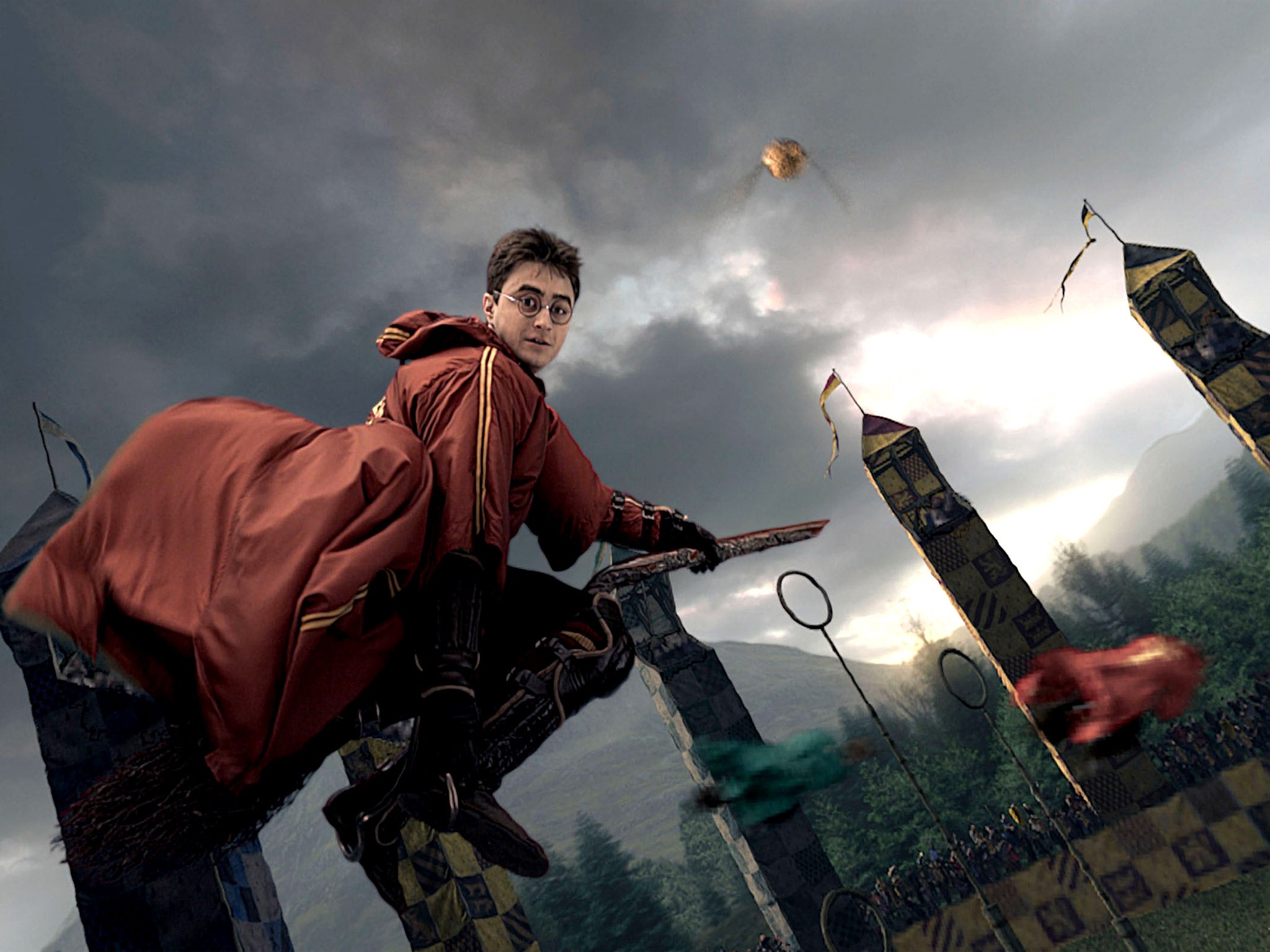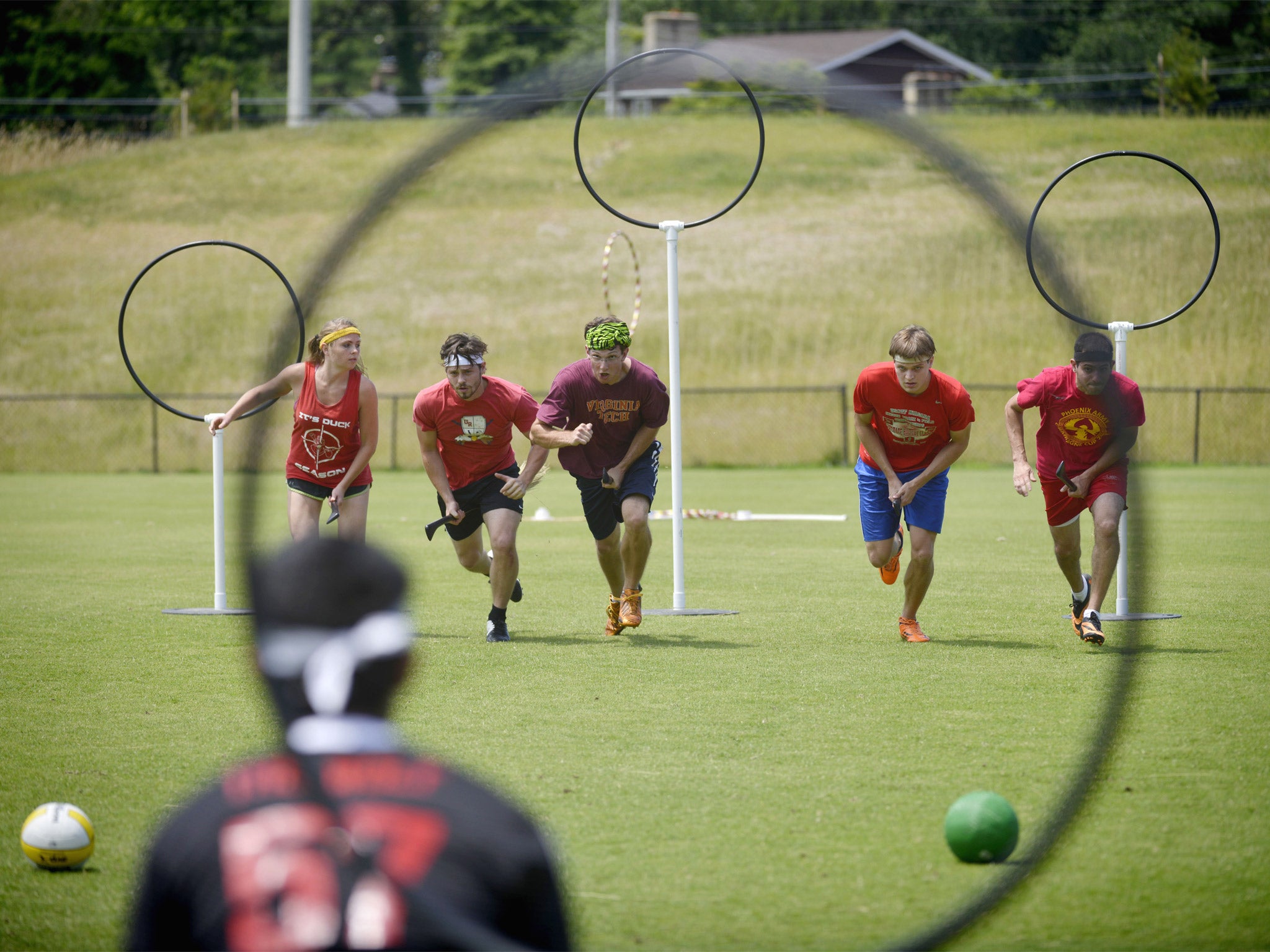How Quidditch has become a real sport: Magical realism
It started as a figment of J K Rowling's imagination. But now the people playing Quidditch for real want to leave Harry Potter behind and be taken seriously, reports Jessica Contrera

Your support helps us to tell the story
From reproductive rights to climate change to Big Tech, The Independent is on the ground when the story is developing. Whether it's investigating the financials of Elon Musk's pro-Trump PAC or producing our latest documentary, 'The A Word', which shines a light on the American women fighting for reproductive rights, we know how important it is to parse out the facts from the messaging.
At such a critical moment in US history, we need reporters on the ground. Your donation allows us to keep sending journalists to speak to both sides of the story.
The Independent is trusted by Americans across the entire political spectrum. And unlike many other quality news outlets, we choose not to lock Americans out of our reporting and analysis with paywalls. We believe quality journalism should be available to everyone, paid for by those who can afford it.
Your support makes all the difference.The Nike-clad coach barks out the words as they appear on the screen: "Rules! Opponents! Officials! Teammates! Self!" Her audience is still attentive more than an hour into her presentation. They soak it up as she encourages them to prove themselves, to be what they knew they could be: athletes. Athletes, with coaches and referees and rule books and fans. But also with brooms. And a guy who runs around as if he is a magical flying ball. No capes, though – they tossed that idea years ago, they promise.
Welcome to the third annual conference of the International Quidditch Association, held last weekend at the Walter E Washington Convention Centre. Quidditch, of course, is a game invented by J K Rowling and detailed in her seven Harry Potter novels. In the game, wizards fly on brooms to score points by catching, throwing and shooting balls through elevated hula hoops. Adapted by muggles (non-wizarding folk) at Middlebury College in Vermont in 2005, the phenomenon has grown to include more than 4,000 players on 300 teams around the world, mostly based at colleges and universities, although several US cities have community teams as well.
The game is typically played on a 30-by-48-yard field on which athletes run with brooms or PVC pipes between their legs, throw volleyballs or dodgeballs at each other and through hoops. Scoring is complex and the highest‑ value manoeuvre involves catching a human embodiment of the "snitch", who sprints around the field of play.

"Attitude is what matters most," the coach, a paid speaker, points out. "Especially when you want to be taken seriously." To be taken seriously, the quidditch players have been adapting the culture of more respected sports by certifying their coaches, standardising the rules and recruiting talented athletes.
The conference last weekend, where some 40 players gathered to improve their coaching, refereeing and team-management skills before playing in a small tournament, was part of that effort. But they've also been trying something else to gain respect: ditching Harry Potter. In recent years and in conferences such as the Washington gathering, the players have been actively disassociating themselves from the fantasy world in which their sport was born. Though most still love the series, they have decided that the sport has outgrown its children's novel roots. And they're not alone. Seven years after the final book was released and four years after the last movie opened, the fanbase for "The Boy Who Lived" – on websites, at conferences and in this college-popular "sport" – is carrying on the Potter legacy by leaving Harry behind.
It was once common for players on college campuses to wear capes, dress as characters from the books and talk about "bringing fantasy to real life". Today, Harry Potter isn't mentioned in the online history of the International Quidditch Association. Instead, hoping to attract former varsity athletes, the group highlights that the activity is a full-contact sport. This year, they are even changing the rules so that all quidditch coaches must be tested and certified.
"As we've pushed to be more of a sport, and as the average college team has become more competitive, it becomes more intimidating for the casual Harry Potter fan who has never played a sport before to join," Logan Anbinder, who has played for the University of Maryland team and the Silicon Valley Skyfighters, says. "And that's kind of sad."
The day after the quidditch coaching session, the conference continued with meetings on injury prevention, tournament planning and referee training. But for one hour on Saturday afternoon, 15 players gathered in room 147A for a discussion on Harry himself. The group was made up primarily of the players who came to quidditch first as Potter fans. They are no longer in the majority.
One had tried to start a team in the second grade. Another still runs a blog where she writes in character as Narcissa Malfoy. One bought a new Hogwarts robe every time she outgrew the previous one, so that she could keep dressing as Hermione. The question on the table was right up her alley: who was a better friend to Harry – Ron or Hermione?
"Hermione is way more useful. I mean, what does Ron do?"
"Just because they fought, true friendship is sometimes hating each other's guts."
"Hermione isn't under the same pressure and circumstances as Ron!"
A few players flipped through tattered copies of the books to make their points, their inner fandom now out in full force. Back and forth they went: is Voldemort redeemable? Is it fair for Rowling to say Dumbledore was gay after the series ended? Does your house affiliation matter after you graduate from Hogwarts? And then it was time to be done. They gathered their books and headed over to the next room, where for the first time they could be certified as official quidditch coaches. The questions took a different form: when can a team be disqualified? When can a player be banned from the league? Does a medical professional need to be present at each match?
They would always be Potter fans, but these days, being athletes mattered more.
A version of this article originally appeared in 'The Washington Post'
Join our commenting forum
Join thought-provoking conversations, follow other Independent readers and see their replies
Comments